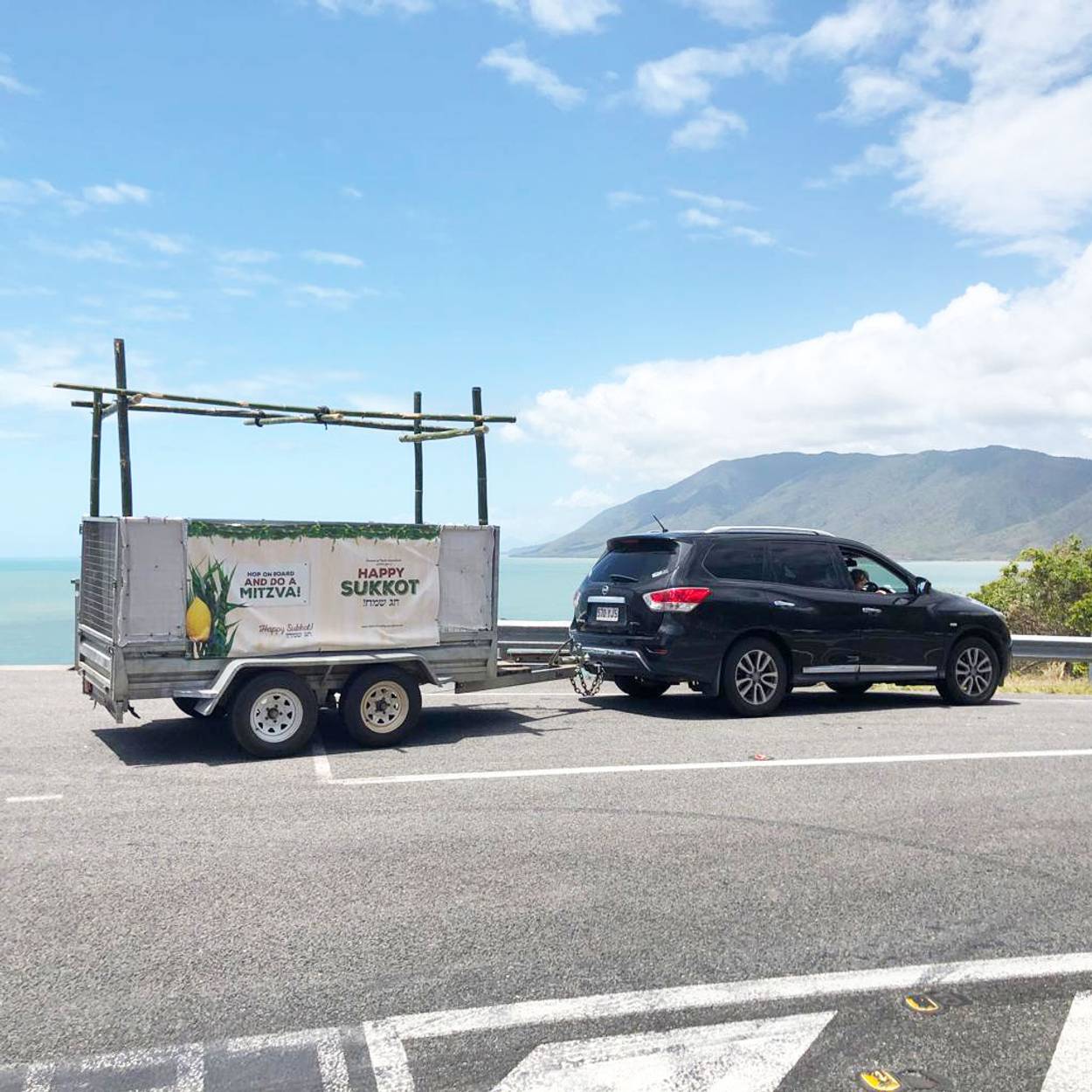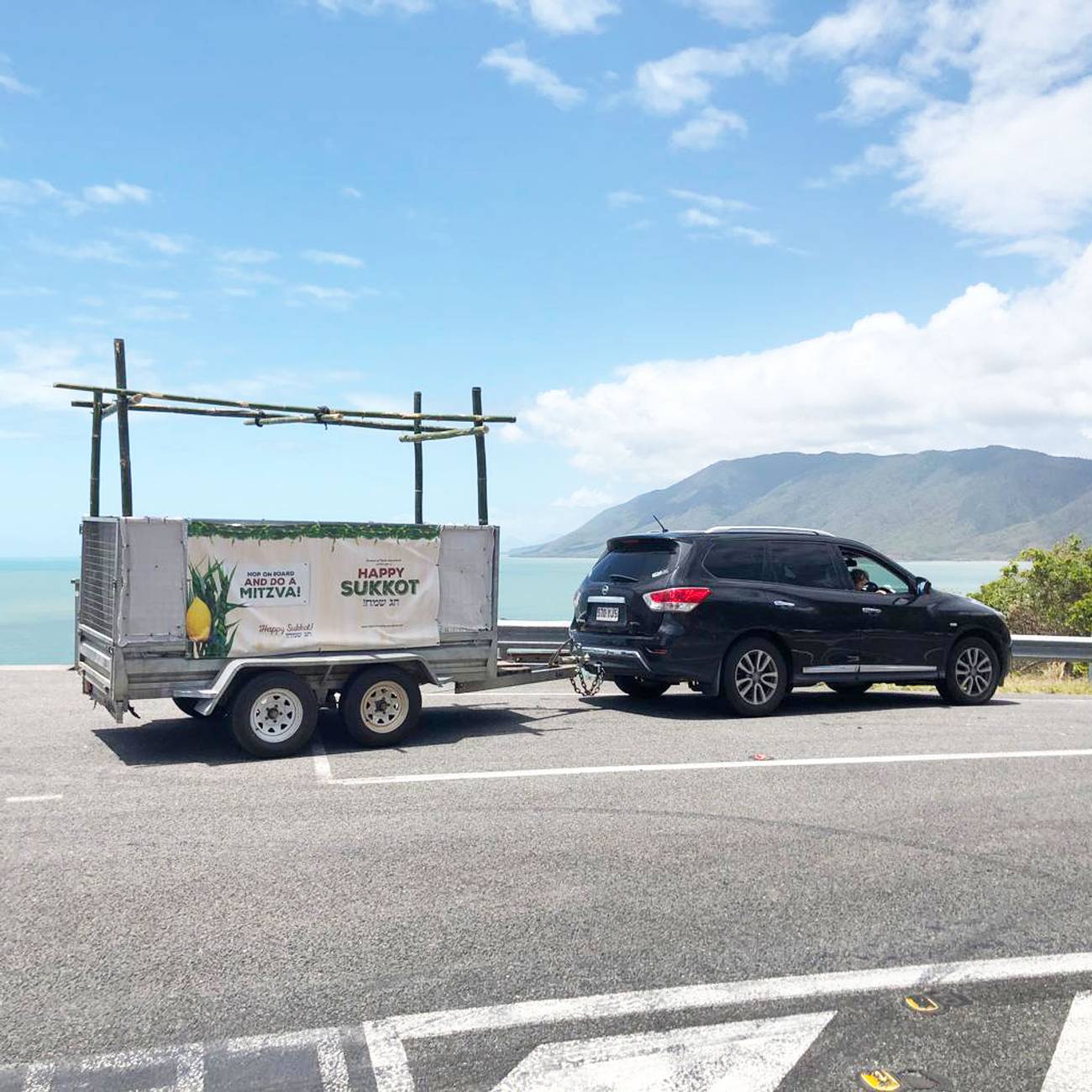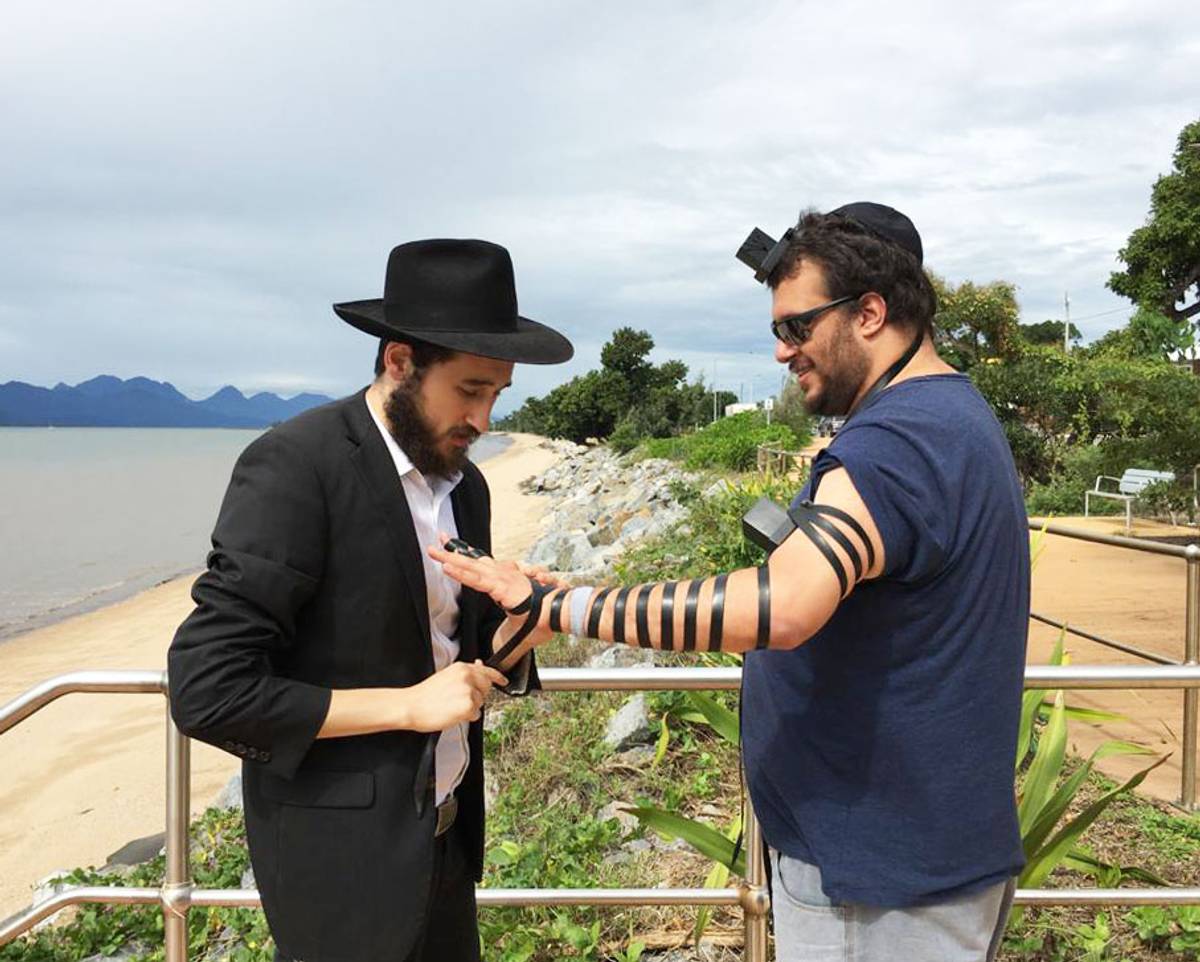Outreach in the Outback
For 20 years, Chabad of Rural and Regional Australia has been connecting with Jews in unexpected places—far from Melbourne and Sydney




In the 1970s, Melbourne businessman Sauli Spigler, then in his early 20s, rented a mobile home and traveled more than 6,000 miles with a few of his friends over a four-week period across the Australian outback.
While this could have been a typical rite-of-passage trip by young people looking for adventure, Spigler had heeded a call from the Lubavitcher rebbe in New York City to seek out Jewish people living in isolated areas, with a mission to connect them with their faith. The Australian outback, known for its red earth, unrelenting heat, and massive distances between tiny municipalities, is not exactly the place you would expect to find many Jewish people. But with their RV operating as one of the first Australian Chabad Mitzvah Tanks—a Jewish home on wheels, stocked with Jewish supplies for the masses, including kosher foods, mezuzahs, tefillin, Shabbat candles, and books of Torah—Spigler and his friends were pleasantly surprised by what they found, even in remote areas.
“During this trip we encountered many Jewish people living in outback Australia and I really saw how many people were wanting to connect to their Judaism,” said Spigler. “Every house welcomed us with open arms, and we could really see the positive effects our visits had on people.”
Following this first trip, Spigler continued his passion for finding Jews living in the Australian outback, and periodically sent emissaries in some of the least inhabited places on earth to keep in touch with them. After a few decades of this, Spigler decided to formally establish Chabad of Rural and Regional Australia, known as Chabad of RARA. As he recently told Tablet, “I established Chabad of RARA to provide some consistent Jewish presence for people living in remote areas: One-off visits are nice, but people really respond well to regular visits and it helps to keep them connected to their Judaism.”
This year, Chabad of RARA is celebrating its 20th anniversary and Spigler’s organization now spans three of Australia’s states—Victoria, New South Wales, and Queensland—and employs full-time four rabbinic couples who permanently live in some of the most remote communities across Australia. With approximately 22 million people living in Australia—an estimated 100,000 of them Jews—the vast majority of the population is concentrated in communities along the beaches and coasts. Chabad of RARA emissaries are responsible for providing to all the Jewish needs of the approximately 10,000 Jews living in towns and areas that are far from any centralized Jewish communities, and are often hundreds of miles away from the closest city.

After spending six years on the road as traveling emissaries, Rebbetzin Malki Rodal and her husband, Rabbi Yossi Rodal, settled in Newcastle, New South Wales, at the beginning of 2020. This harborside city of some 300,000 people, with beautiful beaches and relaxed vibes, already had an existing synagogue that had been constructed in 1900, when the city had an influx of Jewish people due to the mining boom in the area. When the Rodals moved there right before the global pandemic, they arrived to find a synagogue that had not had a permanent rabbi in many years, with a total membership of 40 people. In just over a year of living in the city—100 miles from Sydney—Rebbetzin Rodal and her husband have connected with over 200 Jews in Newcastle and have helped to create a vibrant Jewish community with weekly programs, Shabbat meals, and events.
When asked how she and her husband discover and meet Jews living in regional and remote places in Australia, Rodal was full of practical advice.
“When we arrive in a place where we do not know of any other Jewish people, we often go to a central location in the town, like a post office or pharmacy. In these places there is always an elder resident of the town who knows all of the inhabitants,” she said. “When we ask them if they know any Jewish people, they will often recall something that they heard, even many decades back, about a person who may have Jewish ancestry. And so, like good Jewish detectives, we follow the leads and contact the Jewish residents and ask them what we can do to help connect them to their Jewish heritage despite their remote location.”
Chabad of RARA’s work was the subject of a 2017 documentary focusing on the day-to-day lives of outback rabbinic couples. Screened on Australian TV and at film festivals around the world, it has also contributed to their reputation as Jewish sleuths. “Whenever the documentary screens on Australian TV, we always have an influx of people, often Jews who didn’t know about us, contacting Chabad of RARA via our Facebook page or website asking how they can organize a visit,” said Rodal.
However, despite the increase in technology and internet communication, it is not uncommon for Chabad of RARA’s emissaries to spontaneously meet Jews in unexpected but fortuitous ways. Last Hanukkah, Rabbi Menachem and Rebbetzin Shevy Aron were driving from Melbourne to Coffs Harbor, a beachside location north of Sydney. Faced with a long journey of around 800 miles, they decided to stop for lunch in a tiny town called Cann River, which according to the last Australian census has a total population of 194 people.
“As far as we knew, there were no Jewish people living there” said Rabbi Aron. “We stopped to eat lunch and as we packed ourselves back into the car, to continue our long drive onward, someone walked past us and said: ‘Happy Hannukah!’”
It turns out that this tiny town did in fact have a Jewish resident, unbeknownst to Chabad of RARA, who was thrilled to connect and make acquaintance with the rabbi and rebbetzin. “It helped that we were schlepping a 6-foot menorah on top of our car and we had a Happy Hanukkah sign as well,” chuckled Rabbi Aron, as he reflected on how the resident of Cann River was able to identify him and his wife as Jewish.
This chance encounter in a tiny Australian town epitomizes the experience of the Chabad of RARA couples who, often with their children, spend weeks on the road visiting and finding Jewish people.
Another Chabad of RARA couple, Rabbi Ari and Mushkie Rubin, live in Cairns, a coastal town of 150,000 in far north Queensland that Rabbi Rubin describes as “the Miami of Australia”—a 1,000-mile drive from Brisbane, the state’s largest city. When Rubin and his wife arrived in 2016 they had a big job ahead of them. “There was no Jewish infrastructure there, absolutely nothing: not a single Jewish organization, synagogue, or mikvah! The only thing we knew for certain is that there were approximately 100 Jewish people living there, as we had a list of email addresses that had been collected from the periodic visits different Chabad of RARA emissaries had made over the years,” Rubin said.
These days, the hard work that Rabbi Rubin and his wife have invested in creating a Jewish community has paid off, with over 500 people now part of the Cairns Jewish community. They’ve also opened the first synagogue in Cairns that runs weekly services, a Hebrew school, and bar and bat mitzvah classes.
For Shira Stern, an Israeli living in Cairns with her husband and children, the presence of Rabbi Rubin and his wife has been game-changing. “I don’t know where Rabbi Ari finds all these Jewish people in Cairns!” Stern said with a laugh. Her children attend the Hebrew school and Stern says she is grateful for the strong Jewish identity they feel as a result of the Rubins’ activities: “Having Rabbi Ari and Rebbetzin Mushkie here opens a lot of Jewish opportunities for my kids.”
Earlier this year, Chabad of RARA Cairns likely had the biggest communal Seder in Australia, with over 130 people attending the in-person celebrations. “Cairns was largely spared from the havoc the global pandemic wreaked in other Australian cities that were subject to in-person gathering restrictions and lockdowns—so we have been very blessed here to still be able to host big events here,” Rabbi Rubin said.
The pandemic has also brought unexpected benefits to Chabad of RARA emissaries. As they regularly travel on the road for weeks at a time where they are the only formal Jewish infrastructure, the couples often resort to homeschooling their children. “Once coronavirus hit, people began to understand what we live through while doing this important work,” said Rubin. “Homeschooling your children and always having them at home is our normal experience, but for the rest of the world, this was a new experience!”
The Rodals in Newcastle agreed with Rubin, noting that some aspects of the global pandemic had been a blessing for them. “There has been so much growth in technology and the ability to connect with people who are far out, which means we find it easier to stay in touch with people living in remote areas that we have met,” said Rebbetzin Rodal. Prior to going to live permanently in Newcastle, Rodal and her husband spent years traveling around as the roving Chabad of RARA emissaries of the Australian outback, spending weeks on the road in their Mitzvah Tank seeking out Jewish people living in especially remote central Australian locations like Alice Springs (population 25,000) and Coober Pedy (1,762, according to the last census).
“For almost all the years we were on the road I really wanted to start an online Hebrew school,” said Rodal. “We met kids all around the country and I wanted these children living in a town with only one or two other Jews to be able to connect with other Jewish kids in the same situation as them—except Zoom was not widely used technology and people just were not used to online classes,” she said. However, the onset of COVID-19 changed everything and according to Rodal, “everyone is just so much more connected and used to doing things online in a way that they never had been able to before the pandemic.” Now that online classes and activities have become the new normal, Rodal has since established Zoom classes for these children.
Rabbi Rubin remains optimistic about the future and was keen to share a particularly meaningful text message he received from one of his congregants a few weeks ago: “A community member messaged me saying that one Friday he had an inspirational moment and decided he wanted his daughter to light Shabbat candles,” said Rubin. “He took his daughter’s hand, lit the candles with her, and was about to help her recite the blessing, but she already knew it. Afterward, he sent me a thank-you text message saying he was sure she only knew this blessing because she attends our Hebrew school. The last line of his text said ‘thank you for not forgetting about this forgotten Jew in Cairns.’”
Nomi Kaltmann is Tablet magazine’s Australian correspondent. Follow her on Twitter @NomiKal.